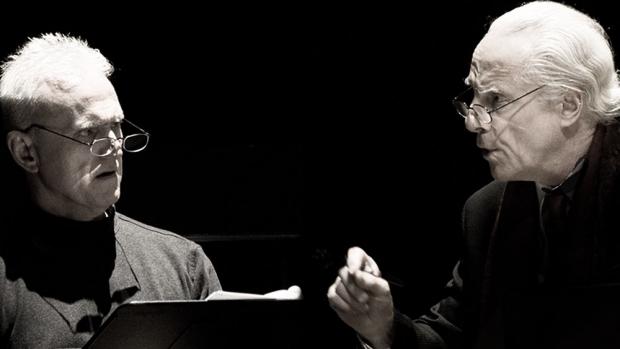Words and Music: Beckett at the Burchfield
The performance ensemble A Musical Feast and two actors are staging Words and Music, a play by Samuel Beckett for three characters, Friday, March 13, at the Burchfield Penney Art Center.
Words by Beckett, music by Morton Feldman, which ensemble director Jan Williams called “lush” and “gorgeous” and “distinctively Feldman-like.” Feldman, a long-time professor at UB, composed the work in 1987, shortly before he died later that year. Williams said to his knowledge the work has not been previously performed in Western New York. He described the Feldman score as not so much accompaniment to the text as integral. Just as the playwright intended.
Beckett’s title isn’t just descriptive of the play, it names the main characters. Words—actor Vincent O’Neill—is one of them. And Music—the ensemble, or maybe more precisely, the music they play—is the other. The third character—actor David Oliver—is named Croak, a kind of mediator between the main characters. Think of the idea of Croak as a kind of midway acoustic between words and music. But with Beckett, of course there is always likely the grimmer reference. Age is a theme of the play. Reference to what age presages and portends. The action we’re all going to perform some day.
Though this is a play with a rather uncharacteristic for Beckett upbeat sense. By the end, anyway. Earlier on, Words is more than a little hostile toward Music, who for his—or her—part seems basically just to want to get along. Be friends. Cooperate. Whereas, Words seems to want to be the whole show. Seems rather full of himself. Of words, that is. And particularly words and sensibilities of Beckett’s two great modern Irish literary predecessors, Joyce and Yeats.
Words starts out in a Thomistic definitional mode—so right away Joycean—on the topic of sloth, which he avers is a passion, which he goes on to describe as “a movement of the soul pursuing or fleeing real or imagined pleasure or pain.” Upon a suggestion from Croak, he replaces the topic sloth with the more interesting and essential topic love, which he now avers is “of all the passions, the most powerful.” Dantean/Joycean. Likely Stephen Dedalus’ mysterious “word known to all men.”
The love suggestion is one among several topics Croak throws out, often with particularly Yeatsian resonances. Tower. Face. Stairs. Friends. Age. Word is susceptible. “Arise then and go now,” he says not clear to whom, a little as if a mystical trance.
But Words can’t seem to do the Yeatsian thing—poetry, that is—without music. Which is to say, Music. The character. He attempts poetry—in a suspiciously Yeatsian vein—on the topic of age, but falters over the words, over the syntax, how they work together. “Age is…age is when…old age I mean…”
Music tries to help, but Words refuses assistance. There ensues a scene—in sentence and phrase fragments—reminiscent of Stephen Dedalus’ dream in Ulysses of his mother’s visit from the grave, “silently she had come to him…her breath bent over him with mute secret words, a faint odor of wetted ashes.” In the Beckett play, “comes in the ashes who loved could not be…comes in the ashes like in that old light…her face…in the ashes…”
Music again—as unobtrusively as possible, it seems—tries to assist. Plays an air, a possible accompaniment. Words gives in. Takes the help, and is able to compose his poem.
Age is when to a man
Huddled o’er the ingle
Shivering for the hag
To put the pan in the bed
And bring the toddy
She comes in the ashes…
Ingle is the fire. But then something happens. Words’ mood and demeanor change suddenly. From tranquil to manic. Raving. About a woman? About death? Maybe of a mother. Maybe a lover. Maybe Hamlet’s Ophelia. Rejecting Music again. So not in poetry, but prose. Partly tongue-tied, partly rising to apocalyptic heights.
But then just as suddenly—grief spent perhaps—depths. “Through the trash…through the scum…” (But with Music again. Peace.)
A little reminiscent of Yeats’s “Now that my ladder’s gone/ I must lie down where all the ladders start/ In the foul rag and bone shop of the heart.”
The full program includes four relatively short works in addition to the Beckett/Feldman project. Two pieces by Elliot Carter, Elegy, performed by pianist Amy Williams, and Figment No. 2 (Remembering Mr. Ives), performed by cellist Jonathan Golove. And two pieces by Amy Williams, Falling, for solo piano, performed by the composer, and a new work still untitled, performed by the composer and Golove.
Musicians in the ensemble for the Beckett/Feldman work include Emlyn Johnson and Kerrith Livengood, flutes; Shieh-Jian Tsai, violin; Virginia Barron, viola; Golove, cello; John Bacon, vibes; and Amy Williams, piano. Jon Hepfer is listed as musical advisor.
The performance is scheduled for 8pm. Tickets are $10.

